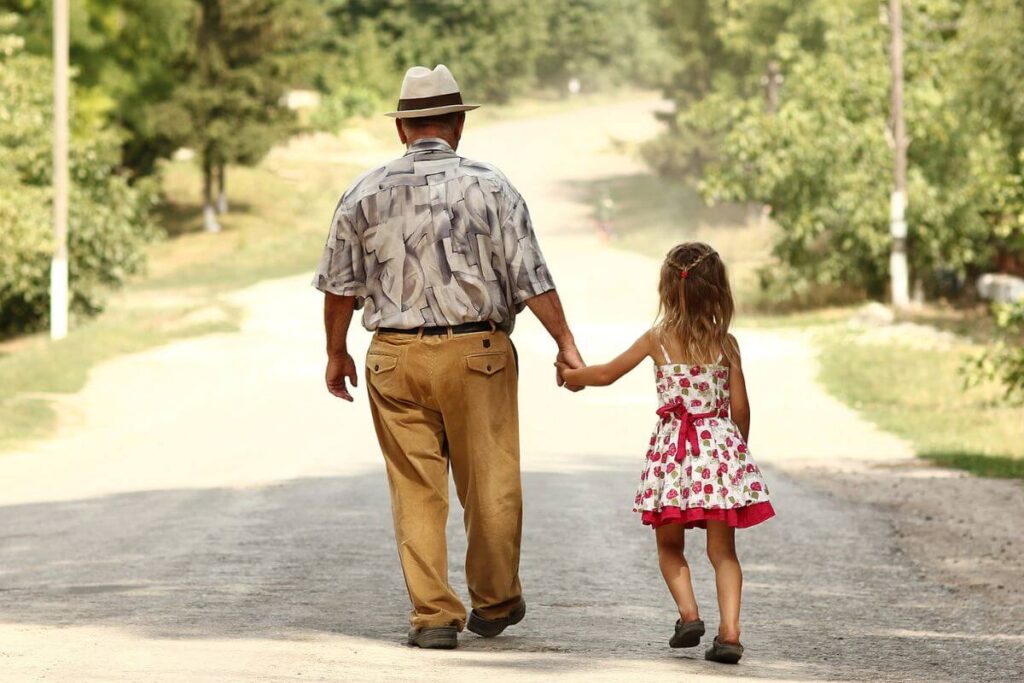How to Deal with Grandparent Alienation (22+ Tips)
Grandparent alienation is a serious issue that has become increasingly more common in recent years. It occurs when a child’s relationship with their grandparents is undermined or broken off due to the influence of another person, usually one of the parents.
Grandparent alienation can have devastating effects on both the children and the grandparents involved, causing distress and disruption in family dynamics. There can be a great sense of loss, grief, and confusion.

Fortunately, I’ve never experienced grandparent alienation, but sadly I know people who have. It’s an important topic to address today because it can have long-lasting psychological effects on family dynamics. But the more we know about the issue, the better we can navigate and mitigate the problems.
In this article, we will look at what grandparent alienation is, its causes, its impact, and how it can be addressed.
What is Grandparent Alienation?
Grandparent alienation, also known as grandparent estrangement or grandparent isolation, refers to the situation in which a grandparent is prevented from having contact with their grandchild or grandchildren.
This may occur when one or both parents of the grandchild prevent the grandparent from seeing the grandchild, either intentionally or unintentionally.
Grandparent alienation can look like any of the following:
- withholding or threatening to withhold contact with the child
- limiting access to grandchildren
- allowing only short-periods of time together, with conditions
- not allowing any contact with grandparents
- not allowing grandparents to celebrate milestones of the children
- emotional blackmailing
- speaking negatively about grandparents to the children
- bullying grandparents
- making false accusations against grandparents that cause estrangement
Grandparent alienation is often considered elder abuse, but it is a very complex situation since laws do not generally give grandparents rights to see their grandchildren. Elder abuse is not supported in most places around the world.
Some professionals consider this form of alienation to be Grandparent Alienation Syndrome because of the negative impact it has on both grandparents and grandchildren. But currently, this label needs more study and research by psychological professionals.
Often, grandparents are fraudulently prevented from having meaningful relationships with their grandchildren. This means the reasons are malicious and not based on the grandchild’s best interest.
I’m not here today to address the legal issues, because truthfully, there are not enough laws in most places to make a difference. But there are other things you can do to help avoid or improve the family relationships that often cause grandparent alienation.
Related Article: 21 Practical Ways to Protect Your Energy in Difficult Times
Grandparent alienation can be caused by a variety of factors, such as divorce, family conflicts, or geographic distance. It can have negative emotional and psychological effects on both the grandparent and the grandchild, as the loss of a grandparent-grandchild relationship can be a significant loss for both parties.

Reasons for Grandparent Estrangement
There are many reasons for grandparent alienation and most of them are quite complex. Some are irrational and unfair, but nonetheless serious to those involved. These are some common reasons for grandparent estrangement:
- Parental conflict: Grandparent alienation may occur when there is a conflict between the adult children and the grandparents, such as in cases of divorce or separation, and lifelong problematic parent/child relationships.
- Parental alienation: Sometimes, one parent may actively prevent the grandparent from having a relationship with their grandchild. This may be done as a form of revenge against the other parent or due to negative feelings towards the grandparent.
- Expectations of a grandparents’ role: Adults sometimes have different expectations of what role the grandparents should take in their children’s lives. When it becomes too complicated, they simply cut ties.
- Geographic distance: Distance may also be a factor that prevents grandparent-grandchild contact. If the grandparent and grandchild live far away from each other, it may be difficult to maintain a relationship.
- Family disputes: Family disputes or disagreements can also cause grandparent alienation, especially if the grandparent takes sides in the dispute.
- Cultural or religious differences: Sometimes, cultural or religious differences can lead to grandparent alienation, particularly if the grandparent’s beliefs or values clash with those of the parents.
- Child abuse allegations: In some cases, allegations of child abuse or neglect may lead to grandparent alienation. The parents may feel that the grandparent is not a safe person to be around their child. Or parent allegations against the other parent may negatively influence grandparent involvement.
- Changes in family dynamics: Changes in family dynamics, such as remarriage or the birth of a new child, can also lead to grandparent alienation. The grandparent may feel left out or ignored in these situations because parents don’t prioritize the relationship.
- Personal challenges: In many cases, personal challenges and mental health issues play a significant role in grandparent alienation. It could be substance abuse or unresolved trauma. Issues of resentment, jealousy, trust, and rivalry may be internal factors that make people behave the way they do.
- Blended families: It can take careful planning and consideration for all grandparents to be involved in blended families. Plus, everyone may have a different perspective about what the involvement should look like in blended families. This often causes a natural course of alienation because of ongoing conflicts.
- Legal issues: Incarceration, lost parental custody, non-custodial parent issues, and parents giving up parental rights can all be causes of grandparent estrangement. Such difficult and dysfunctional family ruptures can make relationships very complex.
- Breaching boundaries: Grandparents who refuse to follow parents’ rules or undermine parents can cause alienation even without doing so intentionally. Speaking badly of parents, giving grandchildren unacceptable gifts, and encouraging them to disobey parents are all potential reasons for alienation.

Why is Grandparent Alienation Rising?
There are many reasons for the rise of grandparent alienation in today’s world. But you can begin by thinking about how complex life is today compared to many years ago.
The many complexities of life today contribute to high stress and chaos within many families, which subsequently lead to poor decision-making, poor relationships, problematic lifestyles, and much more. Consider these five reasons why grandparent alienation may be on the rise:
- Increasing divorce rates: The increasing number of divorces means that more families are being broken apart, leading to a higher likelihood of grandparent alienation.
- Changing family structures: With the rise of single-parent households and blended families, the traditional roles of grandparents may be disrupted, leading to confusion and conflict.
- Increased mobility: People today are more mobile than ever before, often moving away from their hometowns and families for work or other reasons. This can make it harder for grandparents to maintain relationships with their grandchildren.
- High-conflict family dynamics: Families today may be more prone to conflict due to a variety of factors, such as economic stress, substance abuse, and mental health issues. These conflicts can spill over into relationships between parents, grandparents, and grandchildren.
- Legal and cultural changes: In some countries, changes in laws and cultural attitudes have made it easier for parents to restrict access to their children by grandparents. For example, in some places, parental rights are considered more important than grandparent visitation rights.
Overall, while the reasons for grandparent alienation may vary, the trend appears to be linked to broader social changes and more complicated family dynamics that are affecting many aspects of modern life.

How Does Alienation Impact Grandparents?
Grandparent alienation can have a significant impact on the emotional, mental, and physical well-being of grandparents. It can be especially devastating for grandparents who place great emphasis on the role of family and the grandparent/grandchild relationship.
If you’re a grandparent who’s been prevented from seeing your grandchildren, you may be experiencing some tough emotions. It’s totally normal to feel sadness, grief, and a sense of loss when you’re kept away from your grandkids — especially if you’ve had a close bond with them in the past.
But it’s not just emotional pain that you have to deal with. Being cut off from your family can lead to feelings of social isolation, which can make you feel even more lonely and depressed.
Unfortunately, the stress of grandparent alienation can also have negative physical health implications, also. For example, it can lead to increased blood pressure, weakened immune function, and a higher risk of chronic illness.
Furthermore, if you’re considering legal intervention to gain access to your grandchildren, it’s important to know that it could be a long and costly battle. As I shared earlier, there are very few laws that clearly outline the rights of grandparents. So, it’s worth considering all your options before taking legal action.
Remember, many grandparents go through this, and there are resources and support available to help navigate this challenging situation. More on that below.
Grandparent alienation can have a profound impact on the lives of grandparents, affecting their mental, physical, and financial well-being. It can be a painful and difficult situation for grandparents to navigate. Thus, it is important for families to try to find solutions that allow for healthy relationships between grandparents and grandchildren.
Related Article: Why Are Healthy Coping Skills Important in Life?
It is also important for grandparents who are experiencing alienation to focus on their own relationship and supporting each other during this difficult time.

How does Estrangement Effect Grandchildren?
Grandparent estrangement can also have a significant impact on grandchildren. Grandparents often provide emotional, financial, and social support to their grandchildren, and estrangement can leave grandchildren without this important source of support.
It can be especially tough for grandkids who have had a close bond with their grandparents in the past. The loss and grief they feel when they’re prevented from seeing their grandparents can be just as intense as what older folks experience.
This kind of separation can have a negative impact on a grandchild’s mental health, too. Studies have linked grandparent estrangement to depression, anxiety, and behavioral problems in grandkids.
Another way estrangement can hurt grandkids is by interfering with the development of their sense of self. Grandparents can help shape their grandkids’ identity and values, but that process gets derailed when they’re not around.
Estrangement can also create family conflict, which can make things even harder for grandkids. When there’s tension or hostility between relatives, it can add to the emotional distress grandkids are already feeling.
Overall, grandparent estrangement can be a really tough situation for grandkids. Losing the support, both emotionally and financially, of a grandparent can make things much harder. This is why it is important for families to try to find ways to maintain healthy relationships between grandparents and grandchildren, or to seek professional help if necessary.

How to Cope with not Seeing Your Grandchildren
If you’re a grandparent who is experiencing grandparent alienation, please consider these strategies to help aleviate your pain and suffering. And remember that you are not alone.
- Seek support: Alienated grandparents may find it helpful to seek support from family members, friends, or a spiritual support group. Sharing your experiences and emotions can help alleviate feelings of isolation and provide a sense of community.
- Take care of physical and emotional health: Engaging in activities that promote physical and emotional well-being, such as exercise, meditation, or therapy, can help manage stress and promote healing.
- Stay connected: Even if grandparents are unable to see their grandchildren in person, they may still be able to stay connected through phone calls, video chats, or letters. This can help maintain a sense of connection and provide a way to share news and updates. This should be carefully navigated with the parents.
- Focus on other relationships and interests: While not being able to see grandchildren can be painful, it is important for grandparents to focus on other relationships and interests. Focus on other family members and friendships. Look up old friends and make new ones. This can provide a sense of purpose and fulfillment outside of the estranged relationship.
- Seek legal help: Keeping in mind that many places don’t have laws that protect grandparent rights, some grandparents may be able to seek legal intervention to gain access to their grandchildren. An attorney who specializes in family law should be able to help grandparents understand their legal options. Laws regarding grandparent visitation rights vary greatly, but in some cases, courts will consider the best interests of the child in making a decision, especially if there is a history of dysfunction in the family.
- Consider therapy: Therapy can be a helpful way for grandparents to process their feelings and emotions related to the estrangement. A therapist can provide a safe and non-judgmental space to explore complex emotions and develop coping strategies.
- Alienated grandparents support group: There may be a support group in their local area, or online, where they can connect with other grandparents who are experiencing the same situation. This connectedness can often help them feel more supported, plus they can learn how others cope with the similar situations.
- Enjoy hobbies: Alienated grandparents should continue to enjoy hobbies that they once enjoyed before grandchildren, or even explore new hobbies and activities that keep their minds engaged and happy.
Related Article: The Ultimate Guide of Hobbies for Women Over 50
Ultimately, coping with the effects of grandparent alienation is a personal and individual process. It may take time, effort, and support from others to heal and find ways to move forward.

How to Avoid or Repair Grandparent Alienation
There are some basic behaviors that will help avoid grandparent alienation. Many of them are common sense, but when complex family dynamics and different personalities are involved, people sometimes react or behave without thinking clearly.
These are some things grandparents and parents can do to develop and maintain healthy grandparent and grandchildren relationships:
- Maintain open communication: Good communication is key to avoiding misunderstandings and conflicts that can lead to grandparent alienation. It is important for grandparents and parents to maintain open and honest communication, and to express their needs and concerns in a respectful and constructive manner.
- Respect boundaries: It is important for grandparents to respect the boundaries set by parents. This includes following rules related to discipline, communication, and visits. By showing respect for the parents’ decisions and boundaries, grandparents can help build trust and maintain positive relationships.
- Avoid criticism: Criticizing the parents’ decisions or parenting style can lead to tension and conflict, which can contribute to grandparent alienation. It is important for grandparents to avoid criticism and instead offer support and encouragement.
- Build positive relationships: Building positive relationships between grandparents and grandchildren can help prevent alienation. This includes spending quality time together, showing interest in the grandchildren’s lives and activities, and fostering a sense of love and connection.
- Seek professional help: In some cases, families may benefit from seeking professional help to resolve conflicts or address issues that contribute to grandparent alienation. Family therapy or mediation can be helpful in improving communication, understanding each other’s perspectives, and finding solutions that work for everyone.
- Keep the focus on the grandchildren: When grandparents and parents prioritize the well-being and happiness of the grandchildren, it can help prevent conflicts and promote healthy relationships. By keeping the focus on the needs of the grandchildren, families can work together to build positive and supportive relationships that benefit everyone involved.

Reconnecting with Your Grandchildren
Reconnecting with grandchildren after a period of estrangement can be challenging, and should only be done after parents give consent. Here are some steps that grandparents can take to rebuild their relationships with grandchildren:
- Start with a letter: Writing a letter to your grandchildren can be a good way to initiate contact and express your desire to reconnect. Keep the tone positive and avoid any blame or criticism.
- Apologize if necessary: If there were any actions or behaviors on your part that contributed to the estrangement, it can be helpful to apologize and take responsibility for your actions.
- Respect boundaries: If the parents have set boundaries around contact or visits, it is important to respect those boundaries. Work within the parameters set by the parents and avoid pressuring them to change their rules.
- Show interest: Showing a genuine interest in your grandchildren’s lives and activities can help rebuild your relationship. Ask about their interests, hobbies, and school experiences, and listen actively to their responses.
- Be patient: Rebuilding relationships takes time, and it may take several attempts before your grandchildren are ready to reconnect. Be patient and avoid pushing too hard or becoming discouraged if progress is slow.
- Offer support: Grandparents can be an important source of emotional support for their grandchildren. Offer to be there to listen, provide advice, or help out in practical ways when needed.
- Seek professional help: In some cases, it may be helpful to seek the assistance of a family therapist or mediator to work through any lingering issues or conflicts that may be preventing the relationship from healing.
- Take the high road: Regardless of family conflicts or hard-feelings, always take the high road or you’ll risk alienation again. If you’ve made it to the point of reconciliation, you don’t want to be the potential cause of new problems.
Related Article: 25 Positive Things All Kids Need to Hear Growing Up
Remember, rebuilding relationships takes effort and commitment from all parties involved. It is important to approach the process with an open mind and a willingness to listen, learn, and make changes where necessary.

Final Thoughts about Grandparent Alienation
This has been a difficult article for me to write. Fortunately, I have not known this kind of emotional alienation. And it saddens me to know there are many people who do.
Despite the many complexities of grandparent alienation, I have 3 fairly simple recommendations based on my research and experience as a grandparent:
- The very best way to prevent grandparent alienation is not to allow it to happen in the first place. Do your best to keep the line of communication open and respectful with the parents at all times.
- Reflect on your own behavior that may have caused a problem and apologize to the parents, if appropriate. Try to talk to the adults to see if the situation can be resolved.
- And most of all, ask yourself, ‘How is my behavior impacting the children?’ and reflect on your answer. Then model family communication and relationships that you want your grandchildren to emulate in their own lives.
I wish you the very best of luck if you are an alienated grandparent and I hope the information in this article helps you resolve your own situation. If your situation is irreparable, remember that time heals all wounds. Stay strong and live your life with peace in your heart.
You may find solace in these calming quotes for stress and anxiety.
Love to ALL! ~ Susan








